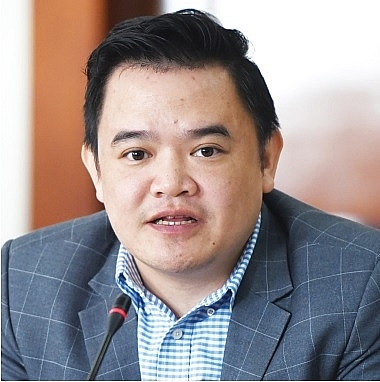Pitfalls in rising investment channels
 |
| Pham Duy Khuong, managing director of ASL Law |
The forex market is a decentralised global market for the trading of currencies, with the nature of forex trading to exchange one currency into another. In other words, investors always buy one currency while selling another, with currencies traded in pairs through forex exchanges. In addition, forex is the largest market in the world and is operated through the central banks of the world’s countries, ensuring transparency and making it near impossible for traders to manipulate this billion-dollar market.
However, although there are many advantages to it, forex trading also brings great risks to investors, the biggest one lying in the selection of an exchange. Taking advantage of this lucrative market, illegal forex brokers have dragged many investors to illegal markets with attractive offers of low investment and high profits. Illegal forex exchanges can collapse out of the blue, leaving investors without interest payments or even completely bereft of their investments.
According to Vietnamese law, the State Bank of Vietnam performs forex transactions exclusively with credit institutions, while other organisations and individuals are not allowed to pursue such transactions.
Cryptocurrency investment
A second – and less established – investment channel is cryptocurrency, which is now one of the most talked-about asset classes today.
Cryptocurrencies were designed as an alternative to fiat currency. Over past years, flagship assets in this bracket have posted stellar rises, with Bitcoin going from $108.53 in 2013 to over $15,520 last week – 143 times its value in just about seven years – pulling along most assets in the same class. Since 2019, many cryptocurrencies are among the most profitable assets for investors, despite repeated warnings about inherent risks.
Security concerns stay the hands of investors: there is less trust in a currency which was designed to fall outside the competence of any supervisory authority and exists only digitally. In addition, the Ministry of Industry and Trade (MoIT) does not recognise virtual currencies as goods or services while the Ministry of Justice does not recognise them as assets. Thus, without the thinnest legal status, investors cannot access the usual dispute resolution mechanisms.
There are a series of unofficial multi-level cryptocurrency exchanges appearing in Vietnam drawing in investors with attractive offers, such as Winsbank, IBG, MyAladdinz, and CashBackPro but the authorities cannot properly investigate their operations because there is currently no legal or regulatory framework, and so they can only issue warnings.
Commodity derivatives
The derivatives market is another emerging investment channel in Vietnam with great potential for investors. A commodity derivative transaction denotes the sale and purchase of large quantities of commodities (classically under a futures contract) such as agricultural products, metals, industrial materials, or oil and gas. If investors can accurately identify market trends and predict future price changes, there is plenty of profit to be had.
Although commodity trading was set up in 2006 in Vietnam, it has since only attracted a small circle of investors with a limited selection of commodity types to be traded under heavily regulated circumstances. Additionally, it was not until June 2018 that the first Mercantile Exchange of Vietnam was launched by the MoIT to operate trade in derivatives, breathing fresh life into the market – but there is plenty of space left for traders.
The expiry date, quality, price, and volume of the commodity is all specified in the derivatives contract by the Mercantile Exchange, which adds a measure of transparency and facilitates the calculations of investors regarding their trades.
In addition, this investment activity has been licensed by the MoIT, so investors can rely on the available legal safety net to protect their legitimate rights and interests.
However, this investment channel revolves far more around the fundamentals, understanding what trends will drive prices in the months or even year to come. In making the wrong judgement calls, investors can make great losses.
Investors are advised to choose reputable trading platforms and steer clear of platforms that are making offers too good to be true. The commodity derivative market is now more heavily regulated than it was at its nascent in Vietnam, with investors accorded more extensive protections and generally more transparency – making it a more appealing investment channel than ever before.
In addition to these three investment channels, there are a few others that are seeing rapid growth before reaching maturity such as cross-border e-commerce and franchising.
Cross-border e-commerce offers a lot of benefits but also has many risks of infringements on intellectual property rights when exporting goods to another country or within Vietnam. At present, numerous parties are taking advantage of e-commerce platforms to sell trademarked or copyrighted products without authorisation.
Under new-generation free trade agreements, intellectual property protection will be strengthened. The risks here are manifold: a franchisee’s business model can be new, the model may not be ready to deal with crises, or the franchise contract could contain unlawful terms. These are potential legal disputes in the future.
What the stars mean:
★ Poor ★ ★ Promising ★★★ Good ★★★★ Very good ★★★★★ Exceptional
Related Contents
Latest News
More News
- Balance to find with overtime reform (March 24, 2022 | 11:33)
- ASL Law managing director among top 100 lawyers in Vietnam (March 12, 2022 | 15:42)
- The role of RCEP in economic recovery of the region (February 17, 2022 | 10:22)
- Supporting policies in Vietnam’s social insurance (September 27, 2021 | 17:12)
- PPP law builds on transparency and proper process (August 02, 2021 | 20:30)
- ASL Law introduces Legal Handbook amid COVID-19 times (July 17, 2021 | 09:47)
- Directions for FIEs and employees in benefits disputes (June 03, 2021 | 22:07)
- The keys to M&A attraction (April 28, 2021 | 16:22)
- Building regulations to secure workers’ rights and interests (April 05, 2021 | 14:27)
- Managing partner of ASL Law Firm ranked top 100 lawyers in Vietnam (March 09, 2021 | 10:34)

 Tag:
Tag:




















 Mobile Version
Mobile Version